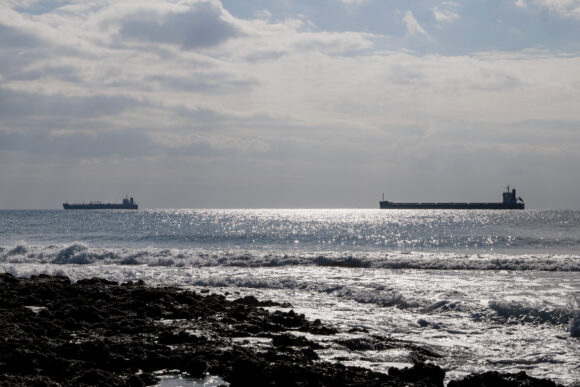The UK plans to launch a “call to action” this week with a group of European nations to target the so-called shadow fleet of oil tankers that Russia uses to skirt international sanctions, according to people familiar with the matter and documents seen by Bloomberg.
An unspecified number of governments are set to endorse a plan on the sidelines of a European Political Community meeting hosted in Britain on Thursday by Prime Minister Keir Starmer, according to a draft statement. They aim to share information about the Russian fleet “to coordinate our responses to the risks posed by its ships and facilitators, and to work with the private sector and other maritime stakeholders to address the threat,” it said.
Officials and experts from the various countries will establish and meet as a group to urgently “take forward concrete measures,” it added.
After Oil, Russia May Be Building a Shadow Fleet for Gas
The countries are trying to make it even harder for Russia to profit from its oil resources. Group of Seven sanctions have looked to turn Russia into a pariah in conventional oil-transportation markets by cutting off access to mainstream tankers and service providers unless the oil being moved is below a G-7 defined price cap. That’s forced Moscow to rely on older carriers that operate outside of industry norms.
Shadow Fleet Threat
“Russia’s ‘shadow fleet’ poses a threat to our nations and others who depend on the world’s seas and oceans,” according to the document, which could still change before it’s signed later this week. “Many ships in this ‘shadow fleet’ are uninsured and poorly maintained. Many engage in activities which violate basic safety and environmental standards and regulations.”
The response could see more Russian dark fleet vessels sanctioned, said one of the people, who spoke on condition of anonymity to discuss confidential matters.
Until last month, the bulk of sanctions had been for violations of the price cap. That only gave Russia a greater incentive to avoid using western services altogether. It contributed to a boom in the use of older tankers — often with undefined insurance status and opaque ownership — that make up the shadow fleet. Some of the tankers have falsified their locations to digital vessel-tracking systems to try to hide their activities.
In December, the International Maritime Organization passed a resolution, A.1192(33), urging all member states and relevant stakeholders to promote actions “to prevent illegal operations in the maritime sector by the ‘dark fleet’ or ‘shadow fleet’.” The European Union cited the resolution when it sanctioned multiple Russian tankers last month, while, prior to that, the UK also directly started targeting shadow-fleet ships.
Enforcing Rules
There are signs these sanctions are proving effective, at least in terms of disrupting tankers that had been moving Russian oil. Of the 50 or so vessels sanctioned since late last year by the US, UK and Europe, the vast majority failed to subsequently load cargoes.
At the EPC meeting, European nations will also call on flag and port states to ensure that safety rules are enforced, including those that relate to ship-to-ship transfer operations and requirements to have on board valid certificates of insurance, according to the statement.
“We urge ship owners and operators, the marine insurance industry, ship brokers and other relevant maritime stakeholders to adhere to their relevant obligations, and support the prevention, detection and reporting of ‘shadow fleet’ activities,” it said.
Photograph: Oil and LNG tanker vessels offshore. Photo credit: Jeremy Suyker/Bloomberg
Was this article valuable?
Here are more articles you may enjoy.



 Insurance Broker Stocks Sink as AI App Sparks Disruption Fears
Insurance Broker Stocks Sink as AI App Sparks Disruption Fears  Experian Launches Insurance Marketplace App on ChatGPT
Experian Launches Insurance Marketplace App on ChatGPT  State Farm Adjuster’s Opinion Does Not Override Policy Exclusion in MS Sewage Backup
State Farm Adjuster’s Opinion Does Not Override Policy Exclusion in MS Sewage Backup  AIG’s Zaffino: Outcomes From AI Use Went From ‘Aspirational’ to ‘Beyond Expectations’
AIG’s Zaffino: Outcomes From AI Use Went From ‘Aspirational’ to ‘Beyond Expectations’ 

